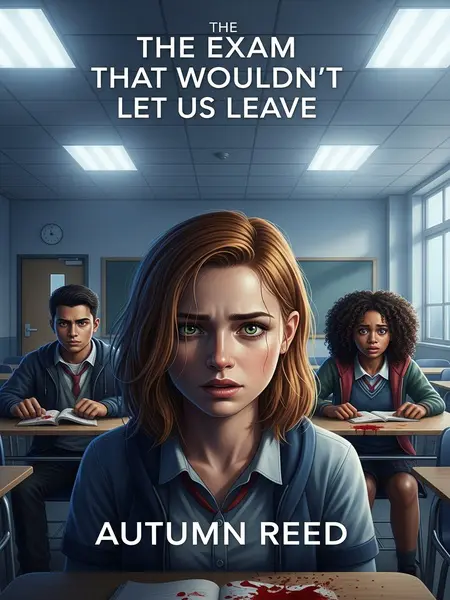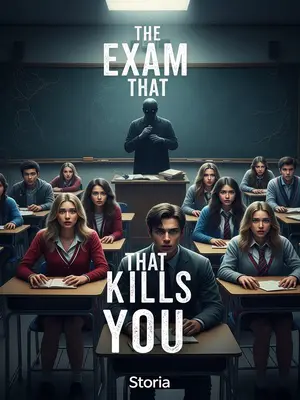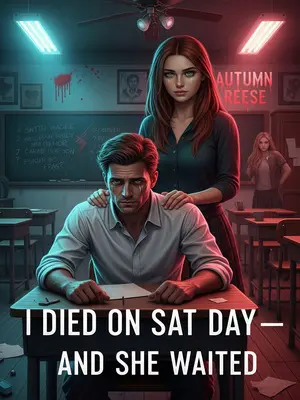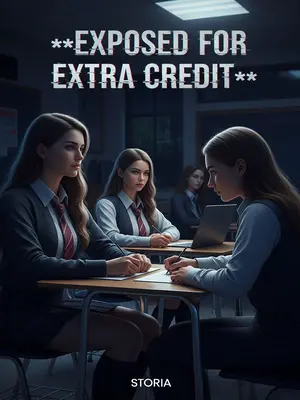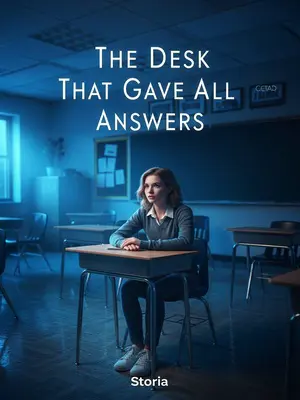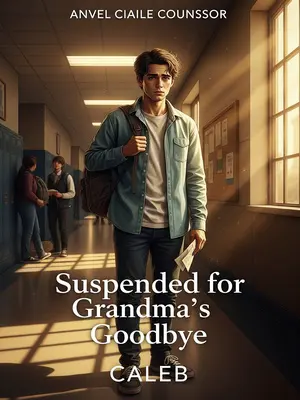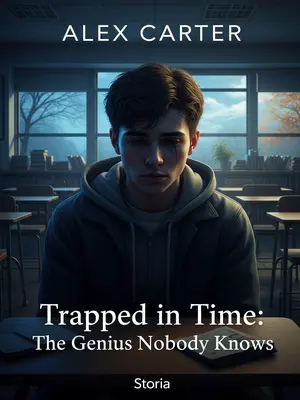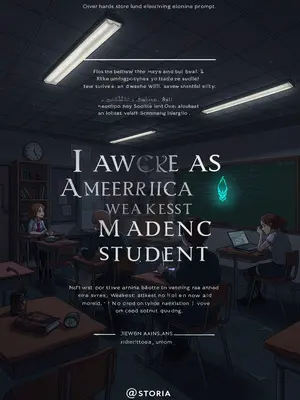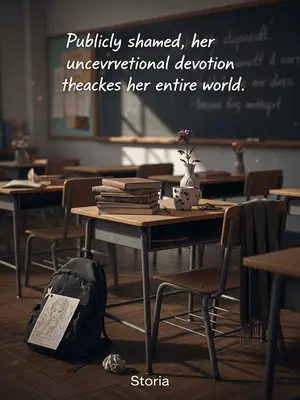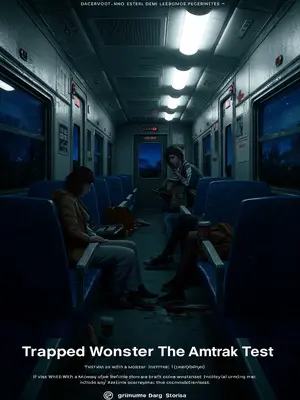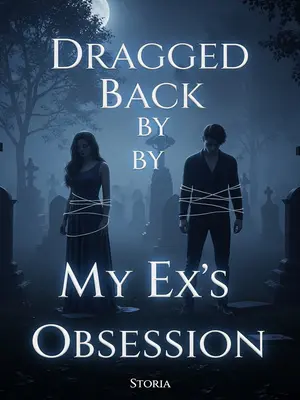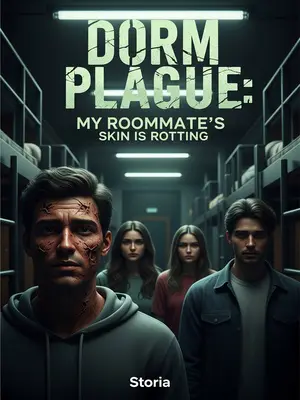Chapter 2: Judged By Our Own Hands
As soon as the announcement ended, my English test turned blank.
The letters faded away, leaving nothing but a blank page, as if daring me to write something—anything—that might save us.
The next second, a new question appeared:
Please evaluate your classmate, Autumn Reed. (20 points)
There it was—my name, bold and black, staring right at me. I felt exposed, like the whole world was watching, waiting for my answer.
I'm Autumn Reed.
The digital display above the whiteboard started a ten-minute countdown.
The numbers ticked down mercilessly, each second a reminder that time was running out. My palms were slick with sweat, my mind racing.
Terrified, I turned to look at my classmates.
Their faces were pale, eyes wide and glassy. Some stared at their own papers, others glanced around, searching for answers that weren’t there. No one met my gaze.
They kept glancing around, but none of their eyes lingered on me. Their faces showed the same fear as mine.
It was like we were all trapped in our own private nightmares, too scared to reach out, too scared to be noticed.
I realized instantly—everyone must have a different question on their test.
The thought hit me like a cold splash of water. I looked around again, this time more carefully, and saw the confusion mirrored in every face.
Otherwise, they’d all be looking at me.
If we all had the same question, I’d be the center of attention. But I wasn’t. That meant we were each being tested—alone, together.
We’re each on our own.
I ran through the exam rules—nothing said we couldn’t share our questions.
My heart pounded. Maybe, just maybe, we could help each other survive this.
“What… what question did you guys get? Ours must be different, right?”
My voice barely rose above a whisper, but it felt like shouting in a church. I braced myself, waiting for the voice to punish me.
After a few seconds with no punishment, someone finally whispered back.
The relief was sharp and sweet. We weren’t alone—not entirely. The rules had loopholes, and we needed every advantage we could get.
Just as I’d guessed, everyone’s question was to evaluate themselves.
It was almost laughable, in a twisted way. Here we were, trapped in a nightmare, and the test wanted us to judge ourselves.
But what exactly were we supposed to evaluate?
Personality? Character? Grades?
My mind raced through every rubric I’d ever seen, every peer review and self-assessment. Nothing seemed to fit.
And what were the grading standards?
If the score was too low, would someone die?
The thought made my skin crawl. I glanced at the clock, the seconds slipping away like water through my fingers.
As class president, I found myself stepping up.
It wasn’t heroism. Just habit, after all those group projects and council meetings. Someone had to take charge, and it might as well be me.
I stood up—it took what felt like forever, but I managed it.
My knees wobbled, but I forced myself upright, feeling every eye in the room flick toward me, then away.
“We can’t waste these ten minutes.” I’d wanted to walk up to the lectern, but it was covered in Mr. Fletcher’s remains, so I just turned to face everyone. “Something has us trapped. Fighting it won’t help. For now, the only way out seems to be finishing the exam.”
I tried to keep my voice steady, but it quivered at the edges. The words sounded surreal, like something out of a horror movie, but I meant every one.
“Why? We’re just regular students!”
Someone cried out in despair.
The words hung in the air, heavy and hopeless. I recognized the voice—Cameron, always the skeptic. His eyes were red, fists clenched tight.
“There’s no point dwelling on why this is happening.” The vice president, Calvin Brooks, stood up too. His gaze swept the room and landed on me. “What we need to discuss is how to finish the exam. Judging by the question, this seems like an essay. That means there might not be a single right answer, but there must be some grading standard. The real question is: what is it?”
Calvin’s voice was calm, almost clinical. He’d always been good under pressure, the kind of guy who could recite SAT words in his sleep. Now, his logic was the only thing keeping us from falling apart.
Eastwood High is a top school in the city, with 22 homerooms per grade. Our class, 3A, is the honors section, which means we’re all pretty sharp. We were freaking out, but survival kicked in—at least for a minute.
We weren’t just book smart—we were used to competing, to analyzing problems from every angle. That instinct kicked in now, pushing back the panic for a precious few moments.
So everyone got what Calvin meant and started to calm down.
The room was still tense, but the wild edge of fear dulled a little. People sat up straighter, eyes focusing, minds working overtime.
If Marcus’s body wasn’t lying there in plain sight, I think we’d be even calmer and more rational.
But the sight of his corpse—split and unmoving—was a constant, grisly reminder of what was at stake. Anyone who looked at him turned white as a sheet.
Marcus Whitaker had always ranked first in our grade and had already been admitted to Stanford. I really couldn’t understand why he’d done something so reckless a minute ago.
He always had a plan. Always kept his cool. Seeing him panic—and pay the price—made everything feel that much more hopeless.
But there was no time to dwell on it.
I quickly looked away and took a few deep breaths to steady my racing heart. “I have a suggestion, but…”
My voice shook, but I gripped the desk and kept going.
“Autumn, just say it! We’re running out of time!” Zoe Harper, who sat to my right, urged.
Her voice shook, but she meant it. Zoe was always the first to speak up, even to teachers. Now, she was looking right at me, begging me to lead.
I swallowed hard. If words could save us, I had to find the right ones fast.
